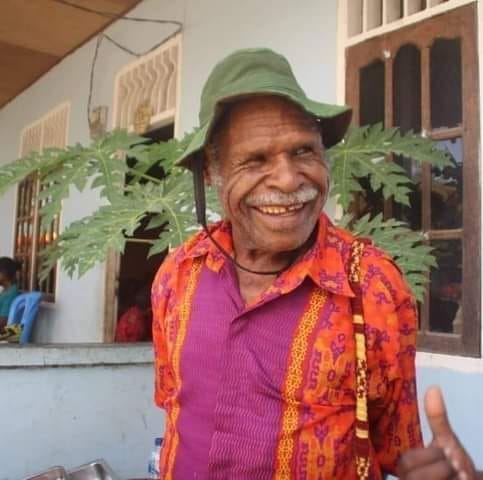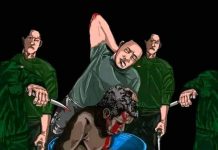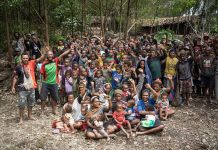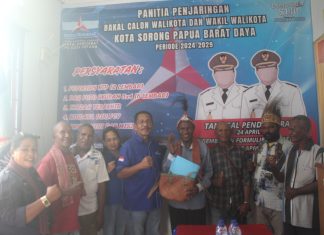Phewwww.. Where to begin.
With apologies that we are very late. The original plan was to ironically publish this on the celebration of Indonesian independence day with the names of Papuan political prisoners. (Yeah we know, Gia can be a bit heavy handed. The rest of the team is trying their best to reign her in.) We hope that everyone can understand that our volunteers are trying hard to keep up with their deadlines and serve our readers at the same time . But publishing before August 17 seemed a bit premature, as before the day was over we couldn’t know for sure that no Papuan had been arrested for failing to celebrate Independence day with proper enthusiasm. Especially because two important things influenced the general political atmosphere before August 17: the rejection of the renewal of the Special Autonomy and the case involving Veronica Koman. Let us deal with these two issues one by one before we move on to the latest update from Intan Jaya and Nabire.
An old Jakarta-Papua dispute is alive again
In the past month, social media has been flooded with pictures of West Papuans holding a sign: Reject Special Autonomy. The cause for this is the impending review and extension of Special Autonomy in Papua. Multiple institutions have called for a rejection of the extension, now colloquially called Otsus Jilid II (lit. translated Special Autonomy vol. 2), arguing that the last twenty years of autonomy have not resolved issues in Papua. As of August 31, forty-four organisations have joined the Petisi Rakyat Papua (lit. translated the petition of Papuan People) in rejecting the extension. There is no doubt that this number will continue to grow.
Apart from the petition, some people organised mass actions to show their rejection of Special Autonomy. In Sorong, some people organised a rally on September 10. Explaining their position, an organiser stated that Autonomy ‘provides no democratic solution to the problems in Papua.’ In Manado, a group of Papuan students were planning a press conference and rally expressing the same sentiment. Local police have responded to this by blocking the entrance to the student dormitory on September 21.
We have no idea why we were trying to list people who are rejecting Special Autonomy, when the real struggle is actually to find people who are actually excited about the extension. Some elements of the national military, it seems, are excited about this. In Manokwari, some communities received visits from men in uniforms and were invited to attend an event to encourage people to support autonomy on August 25. The local military branch has stated that these visits were not authorised.
In any case, if the past is a precedent, the autonomy will be extended. The first version of special autonomy was after all still given in spite of strong rejections from Papuans twenty years ago. (see academic works on that, here and here). This is a test of whether the opinions of Papuan civil societies now matter.
Veronica Koman and the subversion of solidarity
If you paid enough attention to the news between 10-12 August you must have noticed that activist Veronica Koman was ordered to return all the funds she received from the LPDP scholarship for her Masters education. It is unfortunate that LPDP wants a refund as if Koman is a failed investment because of her activism. Koman already made a statement on the use of this demand as a tool to pressure her into returning to Indonesia and face interrogation. Some people on the internet have used this opportunity to point out that this seems targeted because there are a lot of LPDP students who have failed to return to Indonesia. Others have pointed out that this is apolitical because this is just the way LPDP works. The latter must own some rose-coloured spectacles that we really want to borrow in these trying times.
We want to contextualise what has happened to Koman and place it along with the imprisonment of Surya Anta and the arbitrary expulsion of four Khairun University (Unkhair) students in Ternate. They are all ways in which the state and institutions in Indonesia punish its citizens for showing solidarity with Papuans. It is difficult to articulate how infuriating this is when Papuans already have a hard time gaining empathy, understanding and solidarity from other Indonesian citizens. Any demands for justice from Papuans are easily dismissed as treason, making anything about Papua political. This is not just proven by the experiences of Koman and the four students, but also the repeated cancellations and or disavowal of discussions about Papua. You see, this is why we have difficulty reading the demand to return the scholarship as something that is apolitical; it is one among the different ways the Indonesian government punishes people and discourages others from showing solidarity. And while others may say that those actions are justified because of ‘treason’, we are just going to ignore these statements and encourage people who make them to read more.
There were efforts to collect money on her behalf and refund LPDP. Some places ran virtual fundraisings to pay for this, there was one on chuffed.org and Perkumpulan Jubi ran another one. In Nabire and Jayapura (Papua), people were trying to collect money on the streets but police dispersed them. In Dogiyai, there was an eba mukai to raise funds for the same intent. On September 16, Michael Himan, Dano Tabuni, and Ambrosius Mulait visited the LPDP office to symbolically return the money; they brought proof of transfers, one million rupiahs in cash, an Indonesian flag, and a copy of the Special Autonomy Law. They could not meet anyone there, nor in the office of the Ministry of Finance where they headed thereafter. In the end, they left everything at the security post of the office of the Coordinating Minister for Political, Legal, and Security Affairs. We are hoping that this is the end of the story because we really want to move on to other things.
Civilian casualty in the conflict in Intan Jaya
Unfortunately, moving from the topic above does not mean moving on to a lighter topic, it is actually the opposite. We are still monitoring the situation in Intan Jaya as we publish this. However, there are indications of an escalation of the situation in Intan Jaya. Last week there were two clashes between the West Papuan Liberation Army and the Indonesian military. Two Indonesian military officers were killed during the clashes. The West Papuan Liberation Army has admitted responsibility for the deaths of one military officer on September 17 and another death on the 19th in Intan Jaya.
We are reminded that while it is accurate to describe the activities of WPNLA as ‘low-level insurgencies’, it does not mean that these activities have no casualties. Indonesia, especially, has a track record of strongly responding to insurgencies in Papua. These low-level insurgencies also mean almost constant low-level military operations. And this conflict does not spare anyone, not even civilians and members of the clergy.
Reverend Yeremia Zanambani died from a gunshot wound in Hitadipa, Intan Jaya on September 19. He was shot while he went to feed his pigs. According to local witnesses and GKII Church Synod, he was shot by Indonesian military who were searching for the group responsible for the deaths of the military officers and their missing weapons. TNI, on the other hand, has accused WPNLA of shooting Reverend Zanambani. The latter statement for a while was reported without verification in various Indonesian national newspapers; most of which have no reporter on the ground in Papua, let alone Intan Jaya.
Yeremia is not the only victim. The President of the Central Service Agency for the West Papua Baptist Churches Fellowship (BPP-PGBWP) Socratez Sofyan Yoman said three pastor/priests have been killed since 2004. The others are Reverend Geyimin Nirigi was shot to death allegedly by Indonesian Military in Mapenduma District on December 2018 and Pastor Elisa Tabuni who was arrested, handcuffed and shot dead allegedly by Kopassus troops in Tingginambut, Puncak Jaya on August 16, 2004.
We have no idea how to respond to this, and it is these moments of despair that we are again reminded of how grave the situation in Papua is. And also how the lack of journalistic access and press freedom still stands in the way of truth and reconciliation. We still have a long way to go and we are still foolishly hoping that this conflict will not take another life. Our prayers are with the grieving families.
As we are grieving for the priest, we are also grieving how low the quality of journalism is in this country. We have picked the best articles (in Indonesian) explaining the chronology of the killing of the priest. We want to thank the journalists who are working hard to find the truth and refuse to merely quote single sources. The list is: 1. Cerita Gereja dan Saksi di Kasus Dugaan Penembakan Pendeta Yeremia oleh TNI (Budiarti Utami Putri for Tempo), 2. Kematian Pendeta Yeremia: Cari Pembunuh Tentara, Warga Ditembak (Adi Briantika for Tirto), and 3. Misteri Pembunuhan Pendeta Yeremia (Fitriyan Zamzami for Republika).
As we write this newsletter, we have just received information about the death of another priest in Nabire. We are still finding out about the case. Hopefully Suara Papua and Tabloid Jubi will break the news soon.
Bougainvillean just elected its first president!
After a month-long election, finally, Bougainville elected a president: Mr Ishmael Toroama, a former rebel commander, or in Indonesian military terms is “Kelompok Kriminal Bersenjata”. West Papuans congratulated Toroama via social media. It is a little-known fact that the successful referendum and election in Bougainville is considered vital by West Papuans. Yan Christian Warinussy, a prominent West Papuan human rights lawyer, observed that West Papuans sought a similar referendum and self-determination rights, and Bougenville is an ideal case for them. “The referendum will be a concrete example of the implementation of democracy in the majority ethnic Melanesian region in the Pacific region and its impact on the political situation in the Land of Papua going forward,” Warinussy wrote in a press release. Febri has also published an article about Bouganville, if anyone is interested.
Opportunity: Study in UK
Chevening Scholarship is looking for candidates from Maluku and West Papua. If you need any information, we suggest you join this event on September 24, 5-6 PM. Register yourself here.
We will not be giving you anything extra to consume this time, this newsletter is already long enough (not to mention long overdue, so once again our apologies). We know that this newsletter does not give you a large range of emotions; just frustration, dread, worry and deep sadness. So, welcome to the feelings that Papuans have had for a long time.
Ikuti kami dengan klik ini: Voice of Papua






